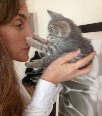
Further Your Education. Further Your Lifesaving.
Amplify your impact in lifesaving through Maddie's® University. Find continuing education (CE) and standalone training programs designed for shelter personnel.
Think of it as graduate school for lifesaving. Register today
March 2017 by Dr. Sandra Newbury
Audience: Executive Leadership, Shelter/Rescue Staff & Volunteers, Veterinary Team
Video Length: 74 Minutes
When Avian Influenza H7N2 infected cats in a New York City animal shelter last year, it was the first outbreak of its kind, and the first documented case of cat-to-cat transmission.
Thanks to an equally historic collaborative outbreak response by organizations and agencies including Maddie's Fund®, the ASPCA, the University of Wisconsin Shelter Medicine Program, New York City Animal Care and Control, the New York City Department of Health, the Centers for Disease Control and the Wisconsin Veterinary Diagnostic Laboratory, many cats' lives were saved. The outbreak also taught health professionals and researchers more about the virus.
In this Maddie's Fund® webcast, Sandra Newbury, DVM, Director of the University of Wisconsin Shelter Medicine Program, will cover the story of the New York outbreak and how shelter medicine allowed it to be contained while saving nearly all the infected cats. She'll focus on how this response allowed the shelter to re-strategize and optimize its abilities for prevention and lifesaving, as well as the diagnostics and preventive practices that animal shelters need to understand to prevent loss of life in future outbreaks.
Attendees will learn:
- What we know about the virus that infected the cats
- How it was identified in the face of significant challenges
- Risk to humans and other species
- Risk to agriculture
- Other shelters affected
- Challenges
- Diagnostic testing
- The inspiring story of the collaborative response
- Quarantine
- Live release recommendations
- Treatment

About Sandra Newbury, DVM
Dr. Sandra Newbury is director of the University of Wisconsin Shelter Medicine Program and Assistant Professor of Shelter Medicine in the School of Veterinary Medicine - Department of Medical Sciences. Dr. Newbury helped build the UC Davis Koret Shelter Medicine Program, and served for six years on the board of directors of the Association of Shelter Veterinarians, where she was the chair of the Shelter Standards Task Force.
Dr. Newbury's focus is on partnerships among shelters, veterinarians and the community, aiming to decrease shelter intake and improve health, welfare and positive outcomes for homeless animals. Her academic work has focused on clinical studies in infectious disease, immunology, and population medicine to improve understanding of shelter animal health, disease response and animal welfare. Dr. Newbury travels throughout the year working with shelters and communities of all kinds across the US, and in Canada, Europe and Australia.
Dr. Newbury and her son share their home in Madison with several minimally compliant and beloved pets.